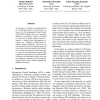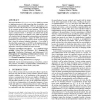34 search results - page 1 / 7 » Recognizing Humor Without Recognizing Meaning |
WILF
2007
Springer
14 years 3 months ago
2007
Springer
Abstract. We present a machine learning approach for classifying sentences as one-liner jokes or normal sentences. We use no deep analysis of the meaning to try to see if it is hum...
ROBOCUP
2004
Springer
14 years 2 months ago
2004
Springer
Abstract. This paper proposes a new algorithm for the automatic segmentation of motion data from a humanoid soccer playing robot that allows feedforward neural networks to generali...
NAACL
2010
13 years 7 months ago
2010
In this paper, we describe an approach based on off-the-shelf parsers and semantic resources for the Recognizing Textual Entailment (RTE) challenge that can be generally applied t...
IWANN
1999
Springer
14 years 1 months ago
1999
Springer
A new model which can recognize rotated, distorted, scaled, shifted and noised patterns is proposed. The model is constructed based on psychological experiments in a mental rotatio...
SIGSOFT
2004
ACM
14 years 10 months ago
2004
ACM
This paper introduces declarative event patterns (DEPs) as a means to implement protocols while improving their traceability, comprehensibility, and maintainability. DEPs are desc...


